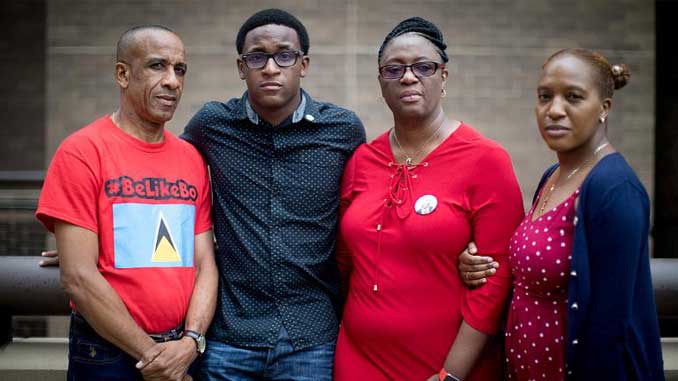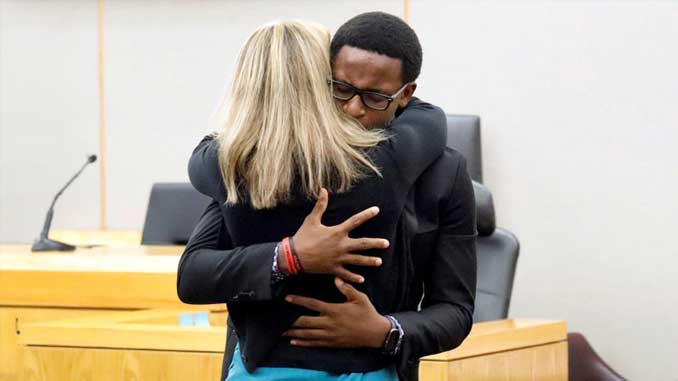
Anne Branigin Writer, the root.com
It was described as “stunning,” “rare,” and “inspirational”: Brandt Jean, the younger brother of Botham Jean, killed last year at the hands of a Dallas police officer who mistakenly walked into his apartment, asking his brother’s killer if he could hug her.
“I love you as a person,” Jean, who had been delivering his victim impact statement, told Amber Guyger at her sentencing. Sobs rippled through the courtroom as the two hugged. “I don’t wish anything bad on you.”

“I think he showed with his grace and forgiveness how we should heal,’’ defense attorney Toby Shook told the Today show’s, Gabe Gutierrez. “And I hope that people who were upset by the verdict will follow his example.”
The presentation of Jean’s act of forgiveness and the ensuing reaction was immediately reminiscent of when the survivors of the Emanuel AME Church in Charleston, S.C., publicly forgave Dylann Roof.
Then, as now, many correctly pointed out the complications with glorifying that act of forgiveness: That it shouldn’t invalidate the value and necessity of black rage. That it shouldn’t be taken as representative of what an entire race of people feels or ought to feel. That their act of forgiveness did not then and does not now absolve the country from dealing with white supremacy or systemic racism.
“What white people are really asking for when they demand forgiveness from a traumatized community is absolution. They want absolution from the racism that infects us all even though forgiveness cannot reconcile America’s racist sins. They want absolution from their silence in the face of all manner of racism, great and small,” Roxane Gay wrote in the New York Times. “I, for one, am done forgiving.”
It was disheartening to see the same American delusions play out again: a high-profile display of forgiveness acting as a proxy for racial reconciliation. Racial reconciliation as a proxy for meaningful, lasting justice.
I do not believe Brandt Jean was delusional to forgive Guyger. What is clear in that embrace is that Jean needed it, had in fact requested it, and the reasons why are not mine to parse or condemn because I have never lost a brother to gun violence or state violence, never had to watch his dying breaths caught on film for the world to see, never had to look his killer in the eye for days on end, measuring for myself what justice will look like in a world where I will never speak to, will never touch, will never hear or see my brother again.
I do know that Brandt Jean has mourned his brother every day for a year and 27 days. I do know that he will mourn his brother for the rest of his life, and that, because forgiveness, like mourning, isn’t a one-time transaction, he will be forgiving Guyger for the rest of his life.
What is delusional is to think reconciliation or forgiveness is the point, as Guyger’s attorney implied. Brandt Jean’s hug was not a political statement but a personal one, and it’s a distinction we need to make if we want to live in a world where his older brother is still alive. Because getting caught up in cheap absolution—an “inspiring” hug between a victim and a killer, meant to teach us how we ought to feel about cops who accidentally (or intentionally) kill the people they’re charged with protecting—is both dangerous and immoral. It distracts us from reckoning with the idea that a white police officer’s murder conviction came, in large part, because her victim was “perfect”: Jean was, quite literally, a choir boy. That the circumstances of his murder were so heinous—sudden and senseless, in his own home, eating a bowl of ice cream—that acquitting her would be a crime.
There are many more victims of police brutality we will never hear about; victims who are disproportionately black. There are many more victims of gun violence whose names we’ll never know.
Jean’s forgiveness of Guyger acquits no one: not Guyger and not the criminal justice system, which ought to show all the black defendants that pass through its halls with the compassion Judge Tammy Kemp showed to the former Dallas officer (she, too, embraced Guyger at the sentencing). It certainly doesn’t acquit America, which currently operates the largest prison system the world has ever known, from challenging the terms of our police state.
Rather than comforting ourselves with a Green Book-Esque visage of racial unity, Americans ought to consider a world where Guyger doesn’t even have a gun the night of Sept. 6, 2018, because our police force is largely unarmed. That the concept of an unarmed police force wouldn’t seem so ludicrous if gun violence weren’t a public health crisis. That disentangling police brutality from racial violence doesn’t just mean better training for cops, it means questioning how often we resort to state-sanctioned violence as a solution for our problems in the first place.
A small act of individual mercy changes none of that. Jean’s mother, Allison, speaking on Today, made that distinction.
“I think what Brandt did this afternoon was to heal himself, and to free himself from what has been wrapped up within him for the last year,” Allison Jean said. “And so we forgive. But I don’t want forgiveness to be mistaken with a total relinquishing of responsibility.”
Recommended For You.



Be the first to comment